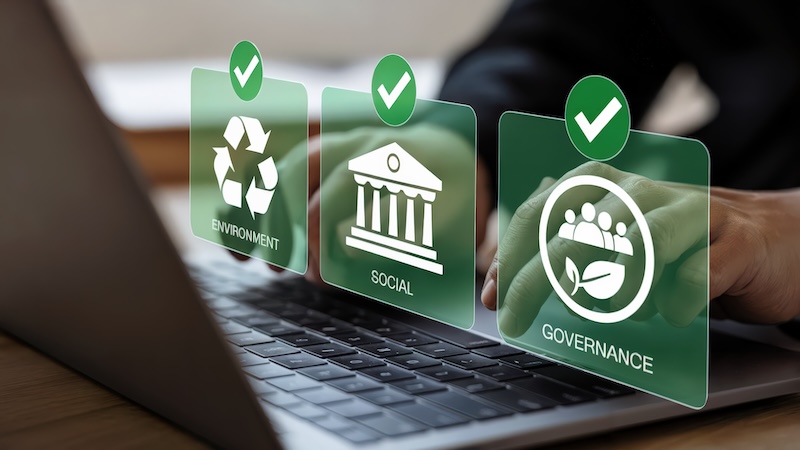Total Corporate Social Responsibility: What It Means and Why It Matters for Brand Reputation

This article explains the concept of total corporate social responsibility and its positive impact on your company’s online reputation.
Corporate social responsibility (CSR) has been a conversation topic for decades, but the expectations placed on businesses today have shifted. Consumers, employees, investors, and partners now look beyond simple charitable giving or branding statements. They want evidence that a company’s impact aligns with its values.
This is where TCSR comes into play.
CSR used to be something companies did on the side — maybe a donation drive or a goodwill project. Total CSR efforts move the focus inward. It means examining how the business operates every day and recognizing the ripple effects those choices have on people, communities, and the company’s public standing.
For organizations that want to grow sustainably and protect their reputation — especially in a world where public trust is hard-won and easily lost — understanding TCSR is no longer optional. It has become a strategic business advantage.
Do you need help with your digital presence? Call us at (844) 458-6735 for an in-depth audit and valuable insights from an expert.
What Is TCSR and How Does It Integrate Into Business Operations?

TCSR refers to an organization’s commitment to ethical, sustainable, and socially aware behavior across all areas of operation. It expands the concept of CSR from departmental initiatives to a company-wide practice.
Rather than viewing social responsibility as part of marketing, investor relations, or human resources (HR), TCSR integrates social responsibility into:
- Brand reputation management
- Crisis response
- Customer and employee engagement
- Long-term business growth strategies
- Operational workflows
- Supply chain partnerships
In other words, total corporate responsibility is not a campaign; it’s a culture-level initiative.
Key Characteristics of Traditional CSR Initiatives vs. TCSR Practices
Let’s go over the main characteristics of CSR and TCSR:
Traditional Corporate Social Responsibility (CSR)
- Often limited to community projects or philanthropy
- Reactive to external pressure
- Seen as a “nice to have,” not a necessity
- Usually managed by a small group or team
TCSR Business Practices
- Company-wide effort, from leadership to entry-level employees
- Considered a strategic business necessity
- Focuses on measurable, transparent outcomes
- Integrated into every operational decision
- Proactive and embedded in the long-term direction
Ultimately, TCSR is a more reliable foundation than CSR practices are for brand trust. Public scrutiny is constant, and stakeholders are increasingly able to identify when a company is artificial and calculated. Today, actual company culture and policy matter more than marketing language.
The Four Core Pillars of TCSR in a Competitive Market

Total corporate responsibility typically operates across four interconnected pillars. Each pillar influences the others, and failing in one area can affect performance throughout the entire organization.
1. Ethical Responsibility
This refers to how a company balances or minimizes its ecological footprint. Focus areas commonly include:
- Energy consumption and transition to renewables
- Waste reduction and recycling systems
- Sustainable sourcing of materials
- Water stewardship
- Lifecycle impact of products
Environmental responsibility is especially visible and measurable, making it a common foundation of CSR evaluation.
2. Social Responsibility
Social responsibility focuses on a company’s impact on individuals and communities. This includes:
- Fair labor practices and worker safety
- Diversity, equity, and inclusion (DEI)
- Pay equity across positions and demographics
- Community partnerships and charitable activity
- Respectful and truthful communication with customers
Social responsibility is also directly tied to public trust. When a company mistreats workers or misleads customers, the reputational impact is severe.
3. Economic Responsibility
Economic responsibility considers how business decisions impact long-term financial sustainability and society at large. Sustainable solutions include:
- Ethical tax practices
- Fair pricing strategies
- Supporting local economies through hiring and partnerships
- Reinforcing economic access and opportunity
- Transparent and socially responsible investing practices
Companies that prioritize short-term gains over long-term health can ruin their credibility over time.
4. Governance Responsibility
Governance practices focus on leadership, policy, and accountability. A responsible business will focus on these core components:
- Ethical decision-making guidelines
- Anti-corruption standards
- Oversight and compliance systems
- Transparent reporting practices
- Diversity in leadership roles
This is often where a company’s reputation is either strengthened or undermined. A company may do excellent external work, but if executives behave unethically, trust collapses quickly.
Why TCSR Matters Now for Business Success

The push toward total corporate responsibility is not abstract or based on theory. It’s grounded in shifting consumer expectations and an increasingly transparent business environment. Here are the major forces driving the rise of TCSR:
Information Moves Fast and Can Go Viral
Social media, consumer reviews, and investigative journalism mean that the following are exposed more quickly and publicly than ever before:
- Poor labor practices
- Environmental harm
- Ethical failures
- Tone-deaf leadership decisions
Even one mismanaged moment can escalate into viral backlash. Reputation management now demands not just response but prevention.
Consumers Expect Alignment With Values That Benefit Society
People no longer buy only based on product quality or price. They want:
- Companies that reflect their values
- Transparency in manufacturing and sourcing
- Evidence of internal fairness and accountability
Trustpilot found that reviews matter more to customers than pricing and discounts, and customers will pay more for the same item from a company with good reviews versus one with no reviews.
Employees Want a Company Culture of Purpose and Fair Treatment
Workforce expectations have significantly evolved. Today’s candidates look for:
- Respectful leadership
- Diversity and inclusion commitments
- Opportunities for growth
- Balance and well-being
- Shared mission
Companies with weak employer reputations struggle with higher turnover, recruitment challenges, lower morale and reduced productivity.
Investors Consider Environmental, Social, and Governance Data
ESG is shorthand for the environmental, social, and governance factors behind how a company operates. Investors look at this information to understand whether a business is acting responsibly and managing risk. Today, that often includes carbon reporting, worker protections, community engagement, and how leadership makes decisions.
How Organizations Can Implement Total CSR Strategies

Below is a practical roadmap that companies can adapt to their size and industry in order to implement TCSR.
Step 1: Conduct a Responsibility and Reputation Audit
Start by examining the following:
- Current public perception
- Internal culture health
- Environmental and operational data
- Stakeholder expectations
- Past criticisms or crises
This establishes a baseline that you can work from.
Step 2: Establish Values That Actually Drive Behavior
Values must be clear, actionable and demonstrable in everyday decisions. Make sure to avoid vague terminology. Real values are what best inform policy.
Step 3: Set Measurable CSR Objectives
Think in terms of specifics: emissions cuts by a certain year, clear diversity milestones, supplier standards, local investment goals, or improvements in retention and culture. The clearer the target, the easier it is to actually move toward it.
Step 4: Assign Responsibility Across Leadership and Teams
CSR efforts only work when everyone participates. This may involve:
- Cross-department committees
- Executive oversight councils
- Accountability tied to performance reviews
By sharing ownership rather than isolating responsibility at the top, organizations create a culture where total corporate responsibility becomes part of everyday decision-making.
Step 5: Create Transparent Reporting Structures
Transparency demonstrates seriousness. This may include showing stakeholders and other interested parties the following:
- Annual impact reports
- Dashboards that show sustainability practices
- Third-party audits
- Publicly accessible commitments
Transparent reporting puts proof behind corporate responsibility. This reinforces trust by showing stakeholders exactly how progress is being tracked and communicated.
Step 6: Integrate CSR Initiatives into Brand Storytelling
Don’t treat your responsibility efforts like a press release. Talk about what’s working, what’s still in progress, and what you’ve learned along the way. When you share the real story instead of the polished version, people are far more likely to believe in the work you’re doing.
Common Barriers to Implementing Total CSR

Shifting from traditional corporate social responsibility to total CSR can be challenging. The biggest obstacles tend to be cultural, not technical. Here’s an overview of the different types of obstacles you may face when making the shift:
Internal Barriers
- Leadership may be resistant to change
- Siloed departments aren’t always aligned
- There may be a misunderstanding of what “impact” means
- Goals or measurements may lack clarity
External Barriers
- Supply chain networks can be complex
- There are regulatory differences around the globe
- Public expectations vary across regions
Understanding these barriers allows organizations to address them proactively instead of reactively.
Examples of TCSR Business Strategies in Practice

The following case examples illustrate the difference between performative and total CSR:
- Meaningful Employee Wellbeing: A large hospitality company adds mental health benefits for employees. Additionally, it considers employee feedback to change scheduling policies so they reduce burnout and turnover.
- Full Supply Chain Accountability: A clothing brand switches to using sustainable fabrics. It also implements third-party audit programs for factory labor conditions. Then, it shares the results of the efforts publicly.
- Community-Centered Growth: A financial services firm partners with local schools to support financial literacy. Additionally, it hires interns from those communities. This creates long-term economic impact, not just a one-time donation.
Each of these examples reflects action being integrated into the core business model.
The Connection Between Total CSR and Corporate Reputation

For companies focused on online reputation management (ORM), total CSR plays an essential role. A brand’s reputation today is shaped by so much, including:
- What it does
- How and what it communicates
- What other people say about it
- How it responds to criticism or crises
Total CSR strengthens each of these layers. Here’s how:
- Authenticity Builds Trust: When actions match values, messaging becomes credible.
- Stakeholder Loyalty Improves: Customers and employees will likely stay when they feel connected to your organization.
- Crisis Impact Is Reduced: A company with a history of consistent, transparent behavior is more likely to be given the benefit of the doubt.
- Media Coverage Becomes an Asset: Journalists often highlight positive corporate leadership when genuine.
- Online Sentiment Stabilizes: Reviews, social conversations, and brand perception reflect lived experience.
You can get started today with online reputation management or repair. Give us a call at (844) 458-6735 to learn more.
What Happens When Companies Ignore Total Corporate Responsibility?
The consequences of ignoring TCSR aren’t abstract. If you fail to run a responsible business in terms of social and environmental impact, unwanted outcomes often include:
- Loss of customer loyalty
- Negative press that goes viral
- Employee turnover and talent shortages
- Investor withdrawal
- Increased regulatory scrutiny
- Long-term brand damage
Always remember that reputation is easier to protect than to repair.
From 24-hour monitoring to upscale content creation and promotion, our team of ORM experts can help you create the online presence you deserve. Contact us at (844) 458-6735 for more information.
Moving Forward: Making Total Corporate Responsibility Part of Sustainable Growth Strategy
Creating core business strategies that prioritize TCSR is not about aiming for perfection. It’s about clarifying your brand’s purpose, being consistent in your behavior, and remaining transparent about your brand’s impact.
Companies that approach TCSR thoughtfully benefit from loyal customers, motivated employees, strong investor relationships and a better digital reputation.
Most importantly, these companies build organizations that are capable of thriving in a world where trust is currency.
Are you ready to strengthen your company’s reputation and communicate its values clearly? Do you want to build lasting stakeholder confidence? We can help.
Our online reputation management services are designed to support companies in developing, protecting, and communicating their commitment to responsible leadership.
When you’re ready to move from intention to impact, contact us at (844) 458-6735 to speak with an expert.
